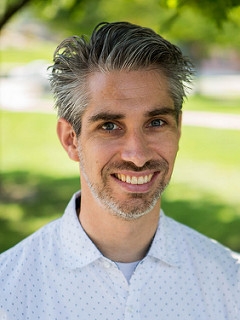I am an Associate Professor of Spanish in the Department of Spanish at Hillsdale College in Hillsdale, Michigan. I have significant experience teaching a broad array of Spanish courses ranging from Beginning Spanish to in-depth considerations of literature, culture, and history from both the Iberian peninsula and the American continent. Additionally, I have taught an introductory series in the Humanities (composition, rhetoric, and analysis), Honors seminars on Disease and Metaphor and Bocaccio’s The Decameron (respectively), and a freshman seminar on Storytelling, Story Listening, and Story Writing.
At the scholarly and extracurricular levels, I have engaged the works of many Spanish authors ranging from the medieval period to the twentieth century. My major academic focus is Spanish Theater, stemming from the Golden Age comedia through contemporary forms. In the past, I have both acted in and written about Spanish comedias, including El caballero de Olmedo, Las cortes de la muerte, El narciso en su opinión, and El retrato vivo. Moving from Lope de Vega and Calderón de la Barca during my undergraduate years to Antonio Buero Vallejo and Alfonso Sastre during my Master’s program, I wrote extensively on Ramón del Valle-Inclán as a doctoral student. I am presently working on three articles: my first piece considers the connections between the medieval and Early Modern periods, specifically through the moralistic influence Juan Manuel had on Juan Ruíz de Alarcón's La verdad sospechosa; my second article deals with a twentieth century author, Ramón del Valle-Inclán, and traces the literal and metaphorical relationship he has with wolves in order to determine their impact and meaning throughout his life and works; and my third study investigates the reasoning behind Albert Camus’s translations of two Spanish Golden Age plays: La devoción de la cruz and El caballero de Olmedo. In April 2018, I collaborated with three fellow Spanish professors to form Dragoncillo, a puppetry troupe dedicated to imaginative, bilingual storytelling
My master’s thesis deals exclusively with the theatrical works of Antonio Buero Vallejo (1916-2000). Specifically, I consider his ‘painterly’ plays Las meninas and El sueño de la razón–works that historicize/fantasize (as Buero describse it) the lives of the famous Spanish painters Diego Velázquez and Francisco Goya, respectively. My proposal is that Buero appropriates the artists’ rebellious stances before an unruly monarch/dictator through their artwork. By literally projecting images of Velázquez/Goya’s paintings upon the stage, he simultaneously condemns his suffocating reality under the shadow of Francisco Franco.
My doctoral dissertation specifically considers Ramón del Valle-Inclán, the bewhiskered bohemian journalist, novelist, poet, and playwright from Galicia, and contextualizes his works at various levels: religiously, politically, aesthetically, philosophically, and theatrically. I demonstrate, over the course of the dissertation, how Valle-Inclán’s final dramatic form, the esperpento, not only represents the ultimate evolutionary phase of his scrupulous aesthetic technique, but also embodies the culmination of crucial historical, cultural, and artistic experiences, e.g., the defeat of the Carlists, the aesthetic degeneration of don Juan, and the demise of hidalguismo, that orient and shape Spanish life at the turn of the twentieth century. Indeed, as the famous Spanish philosopher José Ortega y Gasset deduces, Valle-Inclán is nothing without his circunstancia; instead of preserving it as Ortega y Gassett encourages, however, his esperpentos brutally satirize the Spanish situation, dragging its mythical heroes past distorted mirrors to expose their incompatibility in the twentieth century. While this destructive vision of his present moment can be read inconoclastically, i.e., without any hope for redemption, I argue that Valle-Inclán demolishes in order to rebuild. His plan for the future, scattered throughout essays and hidden in the marrow of the esperpentos themselves, reveals both an inner longing for things as they were, an admittedly impossible realization, and the possibility for metamorphosis–evidence that life can improve, that his circunstancia can be overcome and transformed into something worth preserving.
A side, albeit very dear-to-my-heart, project I’ve pursued over the years entails an investigation into Albert Camus’s fascination with Spain, especially during and after its Civil War (1936-1939). While I specifically consider works that directly target the Iberian Peninsula–e.g., his 1948 play, L’État de siège, takes place in Cádiz, his 1950s translations of Lope de Vega (Le chevalier d’Olmedo) and Calderón de la Barca (La dévotion à la croix) have deep roots in Spain’s Siglo de Oro, and, in 1958, he pens a poignant speech titled “Ce que je dois à l’Espagne,” praising the Republican resistance effort against the abusive Nationalist power–I am also convinced that there remain larger, more profound reasons for his constant rhetorical return to his mother’s native soil.
Specialties:
Literary Specialties:
The Spanish Golden Age (1492-1681 [approx.])
The Spanish comedia (Tirso, Lope, Alarcón, Calderón)
The Generation of ’98 (Unamuno, Valle-Inclán, Baroja)
20th century Spanish theater (Lorca, Buero Vallejo, Sastre)
Theoretical and Philosophical Specialties:
Existentialism
Kierkegaard, Nietzsche (pre-existentialists)
Unamuno
Camus (l’absurde)
Teaching Specialties:
Trained in the ACTFL Teaching Standards
Technology-infused curriculum (web design, learning software, etc.)
Critical and Literary Theory
Community Engagement (via Dragoncillo)
Jared S. White, PhD
Associate Professor of Spanish
Hillsdale College
33 East College Street
Hillsdale, MI 49242
Phone: (517) 607-2441
E-mail: jwhite1@hillsdale.edu

